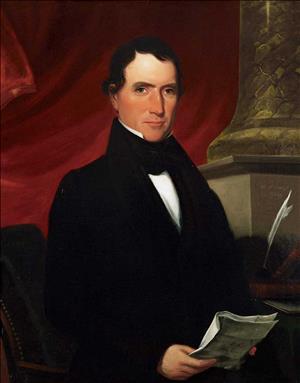On February 24, 1986, the King County Council passes Motion 6461 renaming King County to commemorate the Rev. Dr. Martin Luther King Jr. (1929-1968), the civil rights leader, rather than William Rufus de Vane King (1786-1853), the vice-president-elect for whom the county was named in 1852. King County was originally named by the Oregon Territory Legislature in 1852. Washington Territory was created in 1853.
King County's First Eponym
William Rufus de Vane King was a plantation owner in Alabama who was elected to the U.S. Senate and served there for 34 years. In 1844 he became ambassador to France, and his diplomacy enabled the United States to annex Texas. He was a key advocate of the Compromise of 1850, a series of laws that forged a compromise between slave states and free states concerning the extension of slavery into new states and territories. The compromise kept the Union together for a few more years before the Civil War, but included the Fugitive Slave Act of 1850, a harsh law requiring the return of alleged fugitive slaves from the North back into bondage in the South.
King County's Present Eponym
The 1986 motion to rename King County after Dr. Martin Luther King Jr. reads:
INTRODUCED BY: RON SIMS, BRUCE LAING
PROPOSED NO.: 86-66
MOTION NO. 6461
A MOTION setting forth the historical basis for "renaming" King County after the Reverend Dr. Martin Luther King, Jr., instead of William Rufus DeVane King for whom King County is currently named.
WHEREAS, the County of King in the State of Washington was named after William Rufus Devane King by the Oregon Territorial legislature in 1852, and
WHEREAS, William Rufus DeVane King was a slaveowner and a "gentle slave monger" according to John Quincy Adams, and
WHEREAS, the citizens of King County believe that the ownership of another human being is an injustice against humanity, and
WHEREAS, William Rufus DeVane King earned income and maintained his lifestyle by oppressing and exploiting other human beings, and
WHEREAS, the citizens of King County cherish and uphold the constitutional tenent of the "unmitigated pursuit" of life, liberty, and happiness for which many citizens of this county have given their lives as a supreme sacrifice to defend these foundations of freedom, and
WHEREAS, the citizens of King County through their various faiths uphold the principle that all mankind was created equal, and
WHEREAS, Reverend Dr. Martin Luther King, Jr. believed that liberty, justice and freedom were the "inalienable rights" of all men, women and children, and
WHEREAS, Reverend Dr. Martin Luther King Jr. was a spiritual man who believed all people were created equal in the sight of God, and
WHEREAS, Reverend Dr. Martin Luther King, Jr. believed in the dignity and self-worth of every individual, and subsequently, gave his life defending his beliefs, and
WHEREAS, Reverend Dr. Martin Luther King, Jr. a recipient of the Nobel Prize became a national hero whose birthday has been declared a national holiday by his nation's government to be a day of peace, love and understanding, and
WHEREAS, Reverend Dr. Martin Luther King, Jr. through his persistent and unfailing efforts prompted passage of the Civil Rights Act of 1964, and the Voting Rights Act of 1965, both of which have benefited all citizens of this nation, and
WHEREAS, Reverend Dr. Martin Luther King, Jr. inspired people and nations world-wide to strive in a non-violent manner for the human rights, civil liberties, and economic guarantees rightfully due people of all races;
NOW, THEREFORE, BE IT MOVED by the Council of King County: The King County Council, hereby, sets forth the historical basis for the "renaming" of King County in honor of Reverend Dr. Martin Luther King, Jr., a man whose contributions are well-documented and celebrated by millions throughout this nation and the world, and embody the attributes for which the citizens of King County can be proud, and claim as their own.
BE IT FURTHER MOVED,
King County shall be named after the Reverend Dr. Martin Luther King, Jr.
PASSED this 24th day of February, 1986.
KING COUNTY COUNCIL
KING COUNTY, WASHINGTON
(signed by) Audrey Gruger
Chair
ATTEST:
(signed by) Dorothy M. Owens
Clerk of the Council
A bronze memorial plaque commemorating the name change was placed on the first floor elevator lobby of the King County Courthouse at 3rd Avenue and James Street in Seattle.
Because the state charters counties, the name change could not become official until signed into state law. For eight consecutive years, State Senator Adam Kline sponsored legislation to authorize the name change. State Representative Eric Pettigrew sponsored the bill in the State House of Representatives. On April 19, 2005, Governor Christine Gregoire (b. 1947) signed into law Senate Bill 5332 and King County was officially renamed in honor of Martin Luther King Jr.

